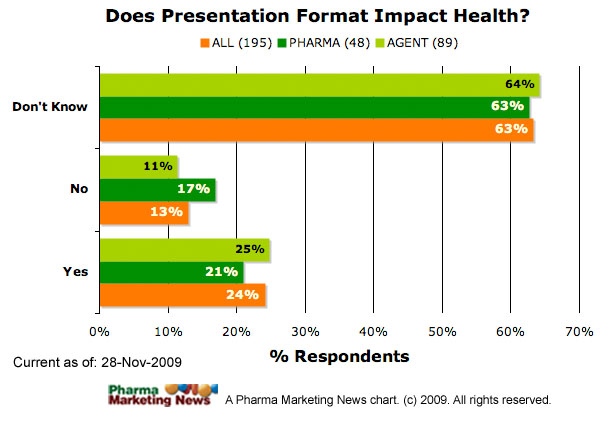In preparation for FDA’s public hearing on the Promotion of Food and Drug Administration-Regulated Medical Products Using the Internet and Social Media Tools, the agency is asking for comments on 19 specific questions (see “Let’s Respond to FDA’s Questions Regarding Its Regulation of Social Media“). These questions are included in my ongong online survey/questionnaire, which you can access here.
I am following the results of this survey closely and will provide updates. Here, I focus on this question:
Are there data to support conclusions about whether different types or formats of presentations have a positive or negative impact on the public health?
NOTE: The FDA may be interested in other “formats” or “presentations” than those available through online social media (see comments below).
The survey asks respondents to choose ONLY one of the following responses (and add additional comments):
- Yes
- No
- Don’t Know
The image below shows how respondents answered this question (ALL respondents vs. PHARMA respondents vs. Agency respondents). The image will be updated frequently. See the date stamp on the image for when it was last updated. To see the most up-to-date results, please take the survey yourself and you will be able to see a summary at the end.

Several comments were submitted in response to this question. Some of these comments include:
- I am not aware of any studies that have related exposure to promotional messages to effects on outcome. On the other hand, there is a growing body of evidence to show that most pharma company efforts to enhance adherence and compliance to their medications have been less than successful
- I don’t know the data, but I believe that for many people, reading the package insert is daunting. I have no option to suggest that would meet regulatory requirements outside of IM or chat, which would be very resource intensive.
- Veracity of the content (based on the authenticity of the author) almost invariably has a positive impact on health.
- Multiple studies have been done to show the effectiveness of various fair balance presentations
- Data not available at this time because so few are using the internet for fear of FDA sanctions.
- I have not come across any data suggesting such in my research, however I imagine informational theories will surface soon. Other topics for discussion may be the possibility for the public to over or under react to health issues based on information they read, or for the uncommon candidate to self-diagnose, which could potentially lead to misguidance on medical education.
- I don’t know the data but I am aware of a lot of misinformation about medical products such as vaccines. I would like to see better feedback mechanisms from non-biased third parties to allow for better correction of memeplexes that have little relationship to reality and have important public health ramifications.
- Scienceblogs does a good job of commenting on the inappropriate medical/science reporting on the HuffingtonPost website. This process might be formalized somewhat on a “RealityPedia” that people could easily link to for a summary of vetted information.
- Please make decisions that are driven by data and by common sense!
- Utilization of Drug Facts Boxes
- After extensive research about social media, I have not come across any data to confirm the impact of social media on public health

SPECIAL REPORT: FDA Regulation of Social Media
Find links to more preliminary results here.









![6 Digital Tools at the Center of Healthcare Digitalization [INFOGRAPHIC]](http://ec2-54-175-84-28.compute-1.amazonaws.com/pharma-mkting.com/wp-content/uploads/2021/04/6DigitalTools_600px-100x70.jpg)




